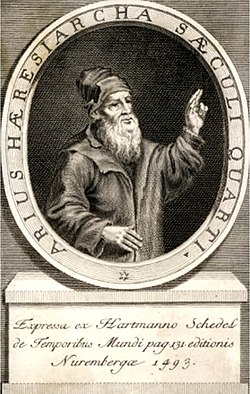Nontrinitarianism

Nontrinitarianism refers to any heresy that denies the doctrine of the Trinity or the divinity of Jesus Christ. The doctrine of the Trinity is central to orthodox Christianity as it asserts that God is one in essence but exists eternally in three persons: Father, Son, and Holy Spirit. To reject this doctrine, or the deity of Jesus, is to deviate from foundational Christian teachings as revealed in Scripture and affirmed by the historic creeds of the Church.
The doctrine of the Trinity is derived from Scripture, where God is presented as one (Deuteronomy 6:4) but also as Father, Son, and Paraclete, each fully and equally God (Matthew 28:19; John 1:1-3; Acts 5:3-4). The early Church formalized this understanding through ecumenical councils, including the Council of Nicaea (325 CE) and the Council of Chalcedon (451 CE), to counter heresies that misrepresented the nature of God.
Within Christianity, denying the Trinity inevitably leads to errors regarding the nature of salvation, worship, and God’s character. For instance, if Jesus is not divine, He cannot be the perfect, sinless sacrifice capable of bearing the infinite weight of humanity’s sin (Hebrews 9:14).
Nontrinitarian systems
Arianism

Arianism was one of the earliest nontrinitarian heresies, which caused Roman Emperor Constantine to organise the Council of Nicaea in 325 to reconcile the Arians and the orthodox Christians. Arianism was developed by the heresiarch Arius, a presbyter in Alexandria who lived between c. 256 CE and 336 CE. Arius argued that Jesus Christ, the Son of God, is not co-eternal or consubstantial (of the same essence) with God the Father. Instead, Arius taught that the Son was a created being, brought into existence by the Father, and therefore subordinate to Him. The Nicene Creed condemned Arianism and affirmed the doctrine of the Trinity, declaring that the Son is "begotten, not made, being of one substance (homoousios) with the Father." Despite this, Arianism persisted for centuries, especially among certain Germanic tribes, before gradually fading by the 7th century and briefly being brought back in the 19th century. Today, Arianism lives on in the declining "Jehovah's Witnesses" denomination.
Unitarianism
Unitarianism is a nontrinitarian heresy that believes for God to be one being, he must also be one person. Unitarians do not believe that Jesus is God. They reject the doctrine of the Trinity, affirmed God's oneness and viewing Jesus as a human teacher and moral leader, not divine. Unitarians see Jesus as having a special relationship with God, often as the Messiah, but interpret biblical references to his divinity metaphorically. Unitarians prioritize Jesus' ethical teachings over theological doctrines about his nature. Modern Unitarian Universalism encompasses many liberal beliefs, often extending beyond traditional Christianity. Muslims also take the Unitarian view of God in a system known as Tawhid.
Socianism
Socinianism emerged in the 16th century as a rationalist critique of orthodox Christianity. Similarly to Unitarians, Socinians rejected the Trinity and the divinity of Christ, asserting instead that Jesus was a mere human chosen by God to reveal his will. They also denied original sin and the substitutionary atonement, believing humans could save themselves from sin and did not need Christ to atone for them.
Binitarianism
Binitarianism teaches that God exists as two persons, Father and Son, while denying the distinct personhood of the Holy Spirit. Some groups, such as the Armstrongist Worldwide Church of God, have historically held this view. This theology is not only reductive, but pointless as it does not counter any arguments against the Trinity or or resolve any theological tensions. Instead, it creates additional inconsistencies by failing to account for the Holy Spirit's clear personhood and role in Scripture, ultimately offering no coherent alternative to orthodox Trinitarian doctrine.
Nontrinitarian groups
Jehovah's Witnesses

Jehovah's Witnesses, usually shortened to JWs, are a heretical Arian restorationist denomination which denies the divinity of Jesus. They claim that Jesus is the incarnation of the Archangel Michael, making Him a created being rather than eternal. They hold to a a disproven pseudo-historical claim that this was the belief taught by the Apostles which became slowly corrupted by the Church Fathers and then stamped out during the Council of Nicaea. This belief has no basis in reality, as even atheist scholars such as Bart Ehrman acknowledge that the Bible is an early source for the doctrine of the Trinity, and the deity of Jesus Christ was affirmed by the early Church. The idea of a theological shift promoted by JWs disregards centuries of biblical scholarship and the consistent understanding of the nature of Christ held by orthodox Christianity.
JWs trace their origins to the 1870s when Charles Taze Russell began a Bible study group in Pennsylvania focused on interpreting biblical prophecy. Russell’s teachings, heavily influenced by Adventist movements, rejected traditional Christian doctrines such as the Trinity and eternal hell. In 1879, Russell founded the "Zion’s Watch Tower Tract Society", which later became the governing body of Jehovah's Witnesses. After his death in 1916, Joseph Franklin Rutherford reorganized the group, officially adopting the name Jehovah’s Witnesses in 1931 to emphasize their focus on proclaiming God’s name, "Jehovah." Under Rutherford's leadership, the group developed its distinct theology and practices, including door-to-door evangelism and refusal of military service.
JWs face serious allegations of misconduct, including financial exploitation, mishandling of sexual abuse cases, and their practice of shunning. Critics accuse the organisation of financially exploiting its members by encouraging large donations, requiring members to devote significant time to door-to-door proselytising, and pressuring them to contribute to the church’s activities. Additionally, the handling of sexual abuse allegations within the organization has come under fire. Many survivors claim that the Watch Tower Society (the governing body of Jehovah's Witnesses) has not adequately addressed or reported cases of abuse, instead often placing more emphasis on protecting the organization’s reputation rather than supporting victims. There have been numerous accusations of victims being silenced or discouraged from speaking out. Additionally, the practice of shunning, where members who are disfellowshipped are cut off from family and friends, has been condemned for causing emotional harm and isolating individuals. These practices have sparked significant controversy and concern over the well-being of members.
Church of Latter-Day Saints (Mormonism)
The Church of Jesus Christ of Latter-Day Saints (LDS Church) is by far the largest church teaching the Mormon heresy as taught by the false prophet Joseph Smith. The LDS Church rejects the traditional Christian doctrine of the Trinity, teaching instead that God the Father, Jesus Christ, and the Holy Spirit are distinct beings, rather than one God in three persons.
While this may seem like a heretical form of Trinitarianism, what makes Mormonism nontrinitarian is the belief held by the earliest Mormons and disciples of Joseph Smith is the idea that God the Father is physically and literally the father of both God the Son and of Satan. Within early Mormonism, Godhood was understood as something that could be attained, with the belief that God the Father himself had once been a human being who had progressed to become a god. This concept of eternal progression and the potential for humans to eventually become gods themselves stands in stark contrast to traditional Christian views of God as eternal, unchanging, and transcendent. The idea of God having literal children, including Satan, directly contradicts the orthodox Christian doctrine of God’s nature and His unique, uncreated, and eternal existence. These beliefs distinguish Mormonism as a nontrinitarian system, fundamentally different from traditional Christianity.
Most LDS Church members no longer believe in these teachings but instead hold to the heretical, but trinitarian, view that God is three beings, a view known as Tritheism.
United Pentecostal Church International
The United Pentecostal Church International is the largest Oneness Pentecostal organisation in the world. The UPCI holds to a unitarian view of God, rejecting the Trinity, but still affirming that Jesus is God. In their belief, God is a single, indivisible being who manifests in different modes or roles as Father, Son, and Holy Spirit, rather than as three distinct persons. This view can sometimes come across as Modalism, but is known as "Oneness" theology, which teaches that Jesus Christ is the full and complete manifestation of God in human form, encompassing both the Father and the Son, and that the Holy Spirit is the active presence of God in the world today.
Worldwide Church of God
The Worldwide Church of God, now known as Grace Communion International (GCI), was once a prominent nontrinitarian Christian denomination. Founded by Herbert W. Armstrong in the 1930s, the church rejected the traditional doctrine of the Trinity, teaching instead that God exists as two beings: God the Father and Jesus Christ, with the Holy Spirit considered not a distinct person but an active force. Armstrong’s teachings also included a unique view of salvation, the belief in observing Old Testament laws (such as the Sabbath and dietary restrictions), and a strong emphasis on prophecy, including the idea that Christ would return to establish God's Kingdom on earth.
In the 1990s, after Armstrong’s death, the church underwent significant doctrinal changes under the leadership of Joseph Tkach and other leaders. The organization formally adopted orthodox Trinitarian theology and rejected many of the distinctive beliefs of Armstrongism. The name change to Grace Communion International in 2009 marked the final step in distancing itself from its previous teachings. Despite this shift, the legacy of Armstrong’s nontrinitarian teachings still influences some groups and individuals who continue to hold to the earlier doctrines of the Worldwide Church of God.
Family of Love
The Family of Love, originally called the Children of God and now known as the Family International, is a nontrinitarian free love cult founded by the false prophet and paedophile, David Berg. Berg, who often called himself "Moses David", led the group with a mix of unconventional theological teachings, including a rejection of traditional Christian doctrines such as the Trinity. The group's beliefs were heavily influenced by Berg's wrongful interpretations of the Bible, with a focus on free love, communal living, and proselytizing.
The Family International has been widely criticized for its practices, particularly its promotion of sexual freedom, which was taken to disturbing extremes in the form of sexual exploitation and the abuse of minors. This aspect of the group’s history has led to numerous legal and social controversies. Over time, the group has attempted to distance itself from some of Berg's more controversial teachings and practices, particularly the sexual aspects, but it remains a subject of criticism and concern. Many former members have spoken out about their experiences, highlighting the psychological and emotional damage caused by the group's practices. Despite its rebranding, the Family International continues to be regarded by many as a cult.
Colchester New Church
The Colchester New Church is a heretical nontrinitarian sect of the British New Church movement. It was originally based on the teachings of Emanuel Swedenborg, an 18th-century theologian. Swedenborg's theology emphasized a rejection of the traditional Christian doctrine of the Trinity, teaching instead that God exists as one indivisible being, with Jesus Christ as the incarnation of God on earth. Swedenborg’s teachings also focused on the idea that the Bible must be understood in a spiritual sense, with an emphasis on inner spiritual growth and salvation through understanding divine truths.
Islam
While not recognized as a Christian denomination, Islam derives much of it's theology from 7th century nontrinitarian Christian groups in Arabia. Islam teaches that God (Allah) is a singular, indivisible being and that Jesus is a prophet, not divine. The belief in the oneness of God, also known as Tawhid, is central to Islamic theology, and Muslims strongly oppose any notion of God manifesting in human form or being divided into distinct persons, as in the Christian doctrine of the Trinity. In Islam, Jesus is revered as a significant prophet and messenger of God, but his role is seen as entirely subordinate to the will of Allah, denying his divinity and the Christian understanding of the Incarnation and the Atonement.
